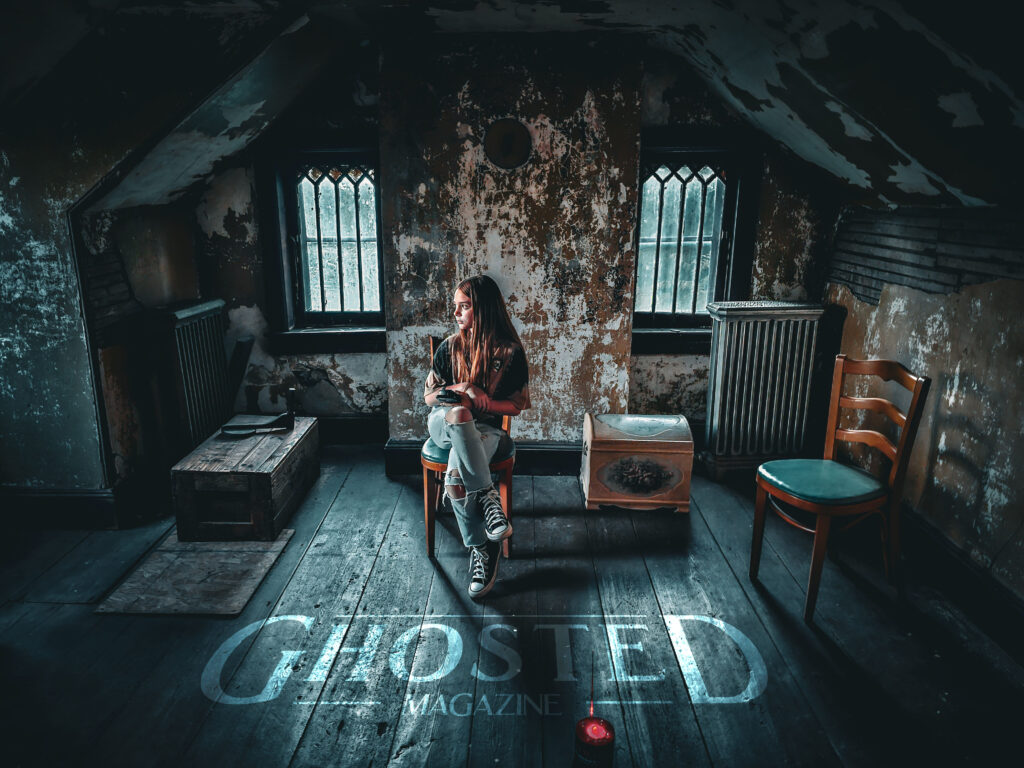Your cart is currently empty!

The Benefits of Introducing Children to the Paranormal
Fostering Curiosity, Critical Thinking, and Emotional Intelligence
If you’re a parent, you know when your child is genuinely interested in something. Sometimes, it’s a fad and sometimes it’s a phase. When my daughter first asked me about ghosts, she was almost 10 years old. She had been interested in scary movies and Stranger Things, but she was also pretty skittish about sleeping alone after watching something scary on TV. To her, ghosts and monsters were all in the same category, so when she would hear about me going on ghost hunts or visiting haunted locations, she was naturally curious. I have to admit, that even to this day, there are some places I will not take her, not because it’s super scary or anything. In some locations where there were acts of extreme violence or trauma, I don’t find it appropriate to subject her to those things. Maybe when she is older and can mentally compartmentalize certain aspects of this field, I’ll bring her along.
The realm of the paranormal, with its mysterious and unexplained phenomena, has long captivated the human imagination. While it might seem unconventional, introducing children to the paranormal can offer a multitude of benefits. This comprehensive exploration delves into the reasons why exposing children to the paranormal can be a positive and enriching experience. By fostering curiosity, critical thinking, and emotional intelligence, children can develop valuable life skills that will serve them well in various aspects of their lives.
Children are naturally curious beings. Introducing them to the paranormal world can channel their curiosity into a constructive and intellectually stimulating direction.
Exploring paranormal phenomena can spark a sense of wonder and awe, encouraging children to ask questions and seek answers. This curiosity drives them to explore the unknown and broaden their understanding of the world.
Engaging with paranormal concepts necessitates critical analysis of evidence and claims. Children learn to evaluate information, discern credible sources, and distinguish between fact and fiction.
While embracing curiosity, children can also develop healthy skepticism. They learn not to accept everything at face value, honing their ability to question and challenge assertions, a vital skill in the age of information overload.
Exploring the paranormal fosters empathy as children learn to appreciate the perspectives and beliefs of others, even when they differ significantly from their own. This understanding is crucial in promoting tolerance and acceptance.
Encounters with the paranormal often evoke fear and uncertainty. By discussing these experiences openly, children learn to manage their emotions, develop coping mechanisms, and build resilience in the face of the unknown.
The paranormal, with its endless possibilities, stimulates creativity. Children can engage in imaginative play, storytelling, and artistic endeavors inspired by the mysteries of the supernatural, encouraging creative expression.
Many paranormal phenomena are deeply rooted in cultural traditions and folklore. Exploring these aspects enhances children’s understanding of diverse cultures, promoting cultural awareness and acceptance.
Engaging in paranormal investigations as a family can create memorable bonding experiences. Collaborative exploration fosters trust, communication, and a sense of unity among family members.
Discussing paranormal topics promotes open communication within the family. Children feel comfortable sharing their thoughts and experiences, strengthening the parent-child relationship and building a foundation of trust.
Paranormal studies encompass various disciplines, including history, science, psychology, and cultural studies. Integrating these topics into education broadens children’s knowledge base, encouraging interdisciplinary learning.
Examining paranormal claims teaches children to evaluate evidence critically. They learn to discern reliable information from misinformation, honing their research and analytical skills.
Engaging in paranormal exploration can introduce children to like-minded individuals who share their interests. This sense of community provides support, validation, and a feeling of belonging, enhancing their self-confidence.
The acceptance of paranormal interests encourages children to embrace their individuality. They learn that it’s acceptable to have unique passions and explore unconventional topics, fostering self-acceptance and self-expression.
Introducing children to the paranormal can be a profoundly positive experience, shaping their curiosity, critical thinking abilities, emotional intelligence, creativity, and cultural awareness. By embracing the unknown, children develop a broader perspective of the world, encouraging empathy, tolerance, and open communication. Moreover, engaging in paranormal investigations within a supportive family environment can strengthen bonds and provide unique educational opportunities.
Parents and educators play a crucial role in guiding children’s exploration of the paranormal. By fostering a balanced approach that combines wonder with skepticism, children can navigate the mysteries of the supernatural world while developing essential life skills. Embracing the paranormal as a realm of curiosity and exploration equips children with the tools they need to face the uncertainties of life with confidence, resilience, and an open mind, ensuring a brighter and more enlightened future for the generations to come.






 designed and developed by
designed and developed by